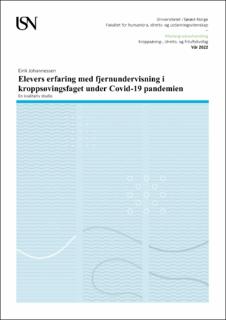| dc.contributor.advisor | Kjønniksen, Lise | |
| dc.contributor.advisor | Grønlund, Jo | |
| dc.contributor.author | Johannessen, Eirik Stenberg | |
| dc.date.accessioned | 2022-08-11T16:42:23Z | |
| dc.date.available | 2022-08-11T16:42:23Z | |
| dc.date.issued | 2022 | |
| dc.identifier | no.usn:wiseflow:6575889:50050138 | |
| dc.identifier.uri | https://hdl.handle.net/11250/3011394 | |
| dc.description.abstract | Denne masterstudien handler om elevers erfaring med fjernundervisning i kroppsøvingsfaget under Covid-19 pandemien. Tematikken ble undersøkt med utgangspunkt i problemstillingen: Hvordan har elever i videregående opplæring erfart fjernundervisningen i kroppsøvingsfaget i perioden desember 2021 til januar 2022? Hensikten med studien er å undersøke hvordan elevene erfarte fjernundervisningen i kroppsøvingsfaget i henhold til elevenes forventninger, relevans, motivasjon og utfordringer med fjernundervisning i kroppsøvingsfaget.
Det ble benyttet kvalitative intervju med elever (N=5) i videregående opplæring for å undersøke studiens problemstilling. Informantene er spredt ved tre skoler og består av tre jenter og to gutter. Teoretisk forankres studien i motivasjonsteori, expectancy-value theory, som er en forventings- og verditeori som er utviklet av Jacquelynne Eccles og Allan Wigfield med kollegaer (1983, 1994, 1995, 1998, 2002, 2005, 2016). Studiens litteraturoversikt viser til studier som er gjort på fjernundervisning i kroppsøvingsfaget nasjonalt og internasjonalt. Litteratursøket viser at det er gjort få norske studier på fjernundervisning i kroppsøving på dette tidspunktet. Studiene i litteraturoversikten, annen relevant bakgrunnskunnskap og motivasjonsteori drøftes opp mot mine funn i kapittel 5.
Funnene mine viser at elever i videregående opplæring har erfart svak motivasjon med fjernundervisning i kroppsøvingsfaget. Elevene fikk oppgaver som stort sett bestod av styrketrening eller utholdenhetstrening. Elevene som hadde autonomien til å velge hva slags fysisk aktivitet de ville gjøre rapporterte og like fjernundervisningen i kroppsøvingsfaget bedre enn elevene som fikk spesifikke oppgaver, men alle elever opplevde allikevel lav motivasjon på grunn av et begrenset sosiale muligheter grunnet restriksjoner og smittevern i samfunnet. Da elevene måtte ut av huset for å gå tur eller jogge, opplevdes dette som mer motiverende i en pandemi enn å gjøre styrkeøvelser hjemme. Dette ga mulighet for å gjøre oppgavene sammen med andre i klassen og det ble ansett som mer relevant og motiverende fordi det liknet mer på vanlig undervisning i kroppsøvingsfaget. Informantene etterlyser mer kontakt med kroppsøvingslæreren sin i perioden med fjernundervisning. I motsetning til de andre skolefagene hadde ikke mine informanter fjernundervisning på skjerm, men de fikk skriftlig forklaring på oppgavene som skulle gjøres. Oppgavene ble dokumenteres ved video, bilde eller på diverse applikasjoner. Informantene rapporterer ingen tekniske utfordringer med fjernundervisning. | |
| dc.description.abstract | This master’s thesis sets out to investigate students’ experiences of distance learning in the physical education subject during the Covid-19 pandemic. This study has been explored based on the following research question: “How have students in upper secondary school experienced distance learning in physical education in the period December 2021 to January 2022?”. Henceforth, this study explores how the students experienced distance learning in physical education, in accordance with the students' expectations, relevance, motivation and challenges with distance learning.
Qualitative interviews with students (N=5) in upper secondary school were used to investigate the thesis’ research question. The students interviewed are spread across three schools and consist of three females and two males. The study is rooted in the expectancy–value theory of motivation, which is an expectation and value theory developed by Jacquelynne Eccles and Allan Wigfield along with colleagues (1983, 1994, 1995, 1998, 2002, 2005, 2016). The study's literature review refers to research that has been done on distance learning in physical education nationally and internationally. The literature review shows that few Norwegian studies have been done on distance learning in physical education at this time. The studies in the literature review, other relevant background knowledge and motivation theory are discussed against my findings in Chapter 5.
My findings show that students in upper secondary school have experienced a lack of motivation with distance learning in physical education. The students were given tasks that mostly consisted of strength training or endurance training. Those who had the autonomy to choose what kind of physical activity they wanted to do reported liking the distance learning in the physical education subject more than the students who were given specific tasks. Nevertheless, all students still experienced low levels of motivation due to the limited social opportunities caused by the Covid-19 restrictions. Being able to leave the house and go for a walk or run outside was experienced as more motivating than doing strength training at home. This provided an opportunity to do the assignments with others in the class and it was considered more relevant and motivating because it was more similar to normal teaching in physical education. The students wished they had more contact with their physical education teacher during the period of distance learning. Unlike the other school subjects, the students interviewed did not have distance learning as an online class with the teacher, but they were given written assignments for the physical activities they had to do and they documented by video, photo, or on various applications. The students report no technical challenges with distance learning. | |
| dc.language | nob | |
| dc.publisher | University of South-Eastern Norway | |
| dc.title | Elevers erfaring med fjernundervisning i kroppsøvingsfaget under Covid-19 pandemien - En kvalitativ studie | |
| dc.type | Master thesis | |
